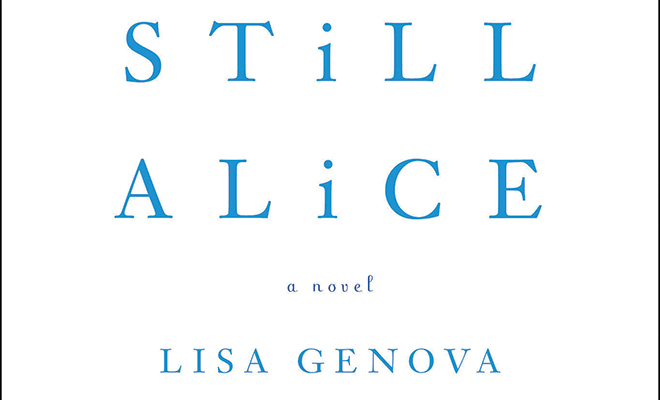
Still Alice By Lisa Genova
Still Alice is a novel written by Lisa Genova about the way Alzheimer’s disease destroys the minds of its victims. Alice is a distinguished Harvard professor of cognitive psychology invested in research and speaking engagements. She has one child, Lydia, and a husband, John, an equally distinguished researcher at Harvard.
The novel starts as Alice begins to notice small memory lapses that she attributes to her approaching menopause. She struggles in silence with these lapses until one day she is taking her morning jog and doesn’t remember how to get home. On most days, she jogs with her husband and they do the route together, but recently he has been working on a research project that makes it difficult for them to jog together. So when she comes to an intersection, one she has been to every day for the last 25 years, Alice is paralyzed with the horrifying realization that she doesn’t know how to get home. She doesn’t know if she should turn left or turn right. Alice is frozen with fright. Finally, as quickly as it had left her, the landscape snapped back into shape, and she automatically knew she should turn left. Alice decides to see her doctor for a few tests and a pill to make it better.
As the novel progresses, the lapses in memory become more frequent. The diagnosis from her gyn is not good. The doctor sends Alice to a neurologist for more tests. Alice fears a brain tumor. As the doctor gives her the standard tests, Alice mentally scoffs at them, secure in her knowledge of how they work and how mentally adept she is at sailing through them with ease. Her field is cognitive psychology and she has served as a negative control for many of the tests before. She is shocked when she is unable to recall the simple three things the doctor told her at the beginning of his examination, indicating recent memory impairment. As the doctor continues his analysis of the tests, he tells Alice that she has early onset Alzheimer’s, and she is devastated.
The novel is a moving portrayal of how Alzheimer’s slowly destroys a brilliant mind and how patients try to overcome their memory lapses. There are many poignant scenes showing how Alzheimer’s affects its victims. In one, Alice cannot find her copy of Moby Dick. It finally appears in the microwave when she starts to make popcorn. She gets up in the morning and checks her to-do list. One day she returns home and begins to organize the kitchen cabinets when her neighbor walks in. Lauren tells her that this is not her kitchen. With all these difficulties, Alice continues her teaching schedule and knows that she is still doing excellent work. Her students love her and she is still a highly rated professor. Or is she?
The novel also delves into how her husband must cope with Alice’s disease as he tries to keep his research and career on track. John gives up a summer speaking tour. He has to take the dangerous step of leaving Alice alone in the house while he goes to his lab at odd hours to check on his experiments. As a scientist, he is very invested in the analytical analysis of Alice’s disease, but he is unable to cope with the daily emotions and details involved in caring for a brilliant woman losing her mind.
The novel has garnered high praise for its accurate portray of Alzheimer’s disease. Julianne Moore won an Oscar in 2015 for her role in Still Alice. The National Alzheimer’s Association has endorsed Still Alice for its accurate portrayal of how Alzheimer’s affects its victims. The novel includes much of the research and trials being conducted around 2008 and it carefully explains the scientific details of the disease and its treatments. Yet the novel progresses and one is drawn into the story as well as having questions answered about the disease.
A 2015 estimate claims 5.3 million Americans of all ages have Alzheimer’s disease and almost two-thirds of these are women. Predictions are that the number will continue to increase as our population ages unless a cure is discovered. Normally, we don’t see them. Silver alerts may be all we notice about patients with the disease. We may see someone who acts a little odd at times, but often we can pass this off without thinking too much about it unless and until Alzheimer’s comes crashing into our lives. Then we realize how devastating Alzheimer’s can be.
Lisa Genova has a PhD from Harvard in neuroscience. Since writing Still Alice, she has become a full-time author and professional speaker. Her latest novel is Inside the O’Briens, a novel about an Irish Catholic family whose patriarch, Joe, is diagnosed with Huntington’s disease. HLM







